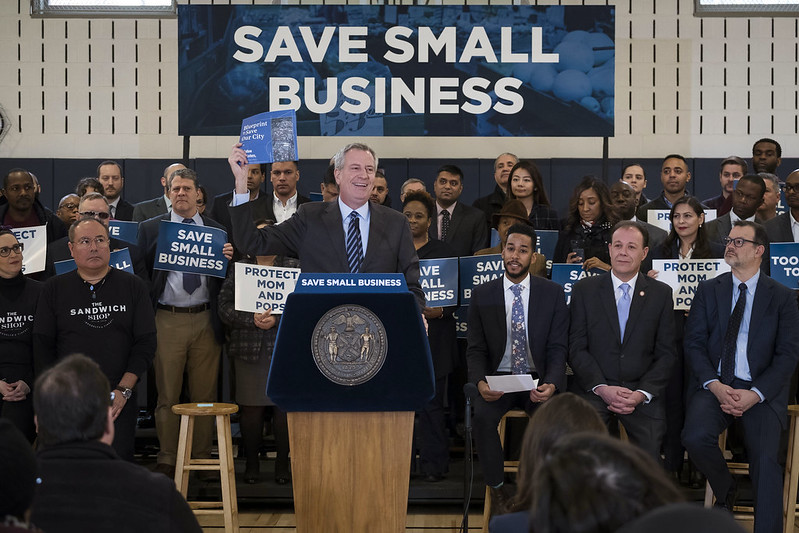
Mayor with a small business plan (photo: Ed Reed/Mayoral Photography Office)
Ryan’s Daughter has been a staple of Yorkville since the 1970s. It’s the local neighborhood pub. There’s a pool table in the back, and the same three old regulars are always sitting at one corner of the bar. On March 15 last year, the owner of the bar made the decision to close. “When covid hit, we were really thinking first about our people,” Jim Gerding told me. “When those first reports came out, I didn’t care about the business restrictions, I cared that people were getting sick.”
In the past year, COVID-19 has had a disastrous effect on this city’s local small businesses. Businesses that were already operating on extremely thin margins have now lost most, or in some cases all, of their revenue, and have had to lay off thousands of workers. According to TrackTheRecovery.org, a research project funded by Harvard University and the Gates Foundation, there are over 40% fewer small businesses open in New York City now than there were in January 2020.
Small businesses are the lifeblood of this city — not only do they employ thousands of workers, but they provide spaces for communities to come together. We need short-term solutions for businesses dealing with the devastating effects of the COVID-19 shutdowns, but we also need longer-term solutions. Far too many small businesses were struggling long before the pandemic, and if we don’t address the root causes of their struggles, we’ll continue to see our beloved local businesses shutter.
First and foremost, we have to get direct financial relief to small businesses. Small business owners I’ve spoken to have depleted their savings and have taken out loans to keep their businesses afloat. The city should utilize federal funds to create its own grant program for small businesses, including a microbusiness assistance fund focused on minority-owned businesses.
We should implement a grant program, similar to what San Francisco’s mayor has proposed, that would provide immediate relief to help stabilize small business operations by offering grants of $5,000 to $25,000, based on the number of employees that each employer had prior to the pandemic.
Our city also needs to do more to connect small business owners with existing state and federal programs. As we saw in the first round of PPP loans, large companies were able to navigate the complex process more easily and quickly, while many smaller companies and businesses were unable to get the relief they needed. One local business owner expressed frustration that upon signing up through the city’s site, she received no help, but found herself inundated with loan offers from various institutions, which now had her contact information.
The city’s Department of Small Business Services should work directly with local community groups, such as Community Boards, BIDs, and neighborhood associations to do direct outreach to local businesses. We must also ensure that this assistance is provided in multiple languages.
Longer term, we need to address the rising costs of owning and operating a business in this city. We can begin by passing the bill (Intro. 2007-2020) sponsored by City Council Member Keith Power that would temporarily eliminate the Commercial Rent Tax for all businesses with an annual base rent of less than $1 million. According to Council Member Powers, “this bill would help approximately 5,500 Manhattan businesses...that are currently paying the tax.”
We should also work to pass the Small Business Jobs Survival Act, which would establish conditions and requirements for commercial lease renewal negotiations, including requirements for lease renewal terms, arbitration-triggering conditions, limits on security deposits, and prohibitions on landlord retaliation.
Delivery services have been critical during this pandemic, but we need to prioritize money going to small businesses and not to Silicon Valley. We need aggressive oversight of these delivery apps. Multiple lawsuits over the past several years have accused companies like GrubHub of charging hidden fees, refusing refunds, and including restaurants on their platforms without the restaurants’ permission. The state should pass the bill (S.8816), similar to a law that was recently passed in California, to require third-party delive ry services to have a valid agreement with a merchant before they advertise, promote, or sell the merchant's products on their platform.
Last year the New York City Council passed a bill that would limit delivery app fees to 15% during, and for 90 days after, a declared emergency that prohibits ordering food on premises. We should make this cap permanent.
One of the biggest complaints I hear from small business owners is that the city does a poor job of communicating, especially when it comes to ever-changing rules and regulations surrounding COVID-19. Gerding of Ryan’s Daughter explained, “as the goalpost would move back further, or the regulations would change, there was never a feeling that this is being well thought-out, from the point of view of the business.”
Last year Mayor de Blasio convened a Small Business Advisory Council, but by October, members of the Council complained that there was not a steady flow of communication from City Hall. The city must convene regular meetings of the Small Business Advisory Council. The mayor should assign a City Hall point person to address concerns from the Council, and establish inter-agency coordination so that business owners are not forced to navigate multiple agencies for guidance and support.
As we slowly recover from this terrible pandemic, we must ensure that our local small businesses are not left behind. With ever-increasing vacancies, the city must act boldly, and do more to provide resources and create opportunities for local businesses to thrive.
***
Kim Moscaritolo is a Democratic candidate for City Council in Manhattan’s 5th District. On Twitter @KimMosc.
***
Have an op-ed idea or submission for Gotham Gazette? Email This email address is being protected from spambots. You need JavaScript enabled to view it.




